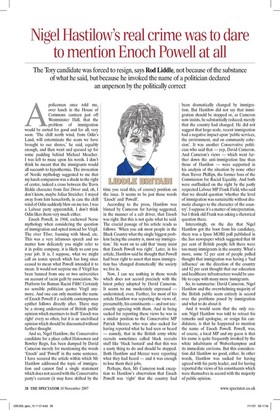Nigel Hastilow's real crime was to dare to mention Enoch Powell at all
The Tory candidate was forced to resign, says Rod Liddle, not because of the substance of what he said, but because he invoked the name of a politician declared an unperson by the politically correct Apoliceman once told me, over lunch in the House of Commons canteen just off Westminster Hall, that the problem of immigration would be sorted for good and for all, very soon. 'The chill north wind, from Odin's Land, will exterminate the scum we have brought to our shores,' he said, equably enough, and then went and queued up for some pudding behind Michael Meacher. I was left to muse upon his words. I don't think he meant that the immigrants would all succumb to hypothermia. The invocation of Nordic mythology suggested to me that my lunch companion was a shade to the right of centre, indeed a cross between the Travis Biclde character from Taxi Driver and, oh, I don't know, maybe Julius Streicher. I stayed away from him henceforth, in case the chill wind of Odin suddenly blew on me too. I was a Labour party apparatchik. I don't think Odin likes them very much either.
Enoch Powell, in 1968, eschewed Norse mythology when considering the question of immigration and opted instead for Virgil. The river Tiber, foaming with blood, etc. This was a very infamous speech and no matter how delicately you might refer to it in polite company, it is likely to cost you your job. It is, I suppose, what we might call an iconic speech which has long since ceased to mean what Powell intended it to mean. It would not surprise me if Virgil has been banned from one or two universities on account of racist guilt by association. No Platform for Roman Racist Filth! Certainly no sensible politician quotes Virgil anymore. And one can only mention the name of Enoch Powell if a suitably contemptuous epithet follows directly after. There may be a strong undercurrent of British public opinion which murmurs to itself 'Enoch was right' every so often, but it is an uncivilised opinion which should be discounted without further thought.
And so, Nigel Hastilow, the Conservative candidate for a place called Halesowen and Rowley Regis, has been dumped by David Cameron merely for mentioning the words 'Enoch' and 'Powell' in the same sentence. I have scoured the article within which Mr Hastilow addressed the topic of immigration and cannot find a single statement which does not accord with the Conservative party's current (it may have shifted by the time you read this, of course) position on the issue. It seems to be just those words 'Enoch' and 'Powell'.
According to the press, Hastilow was binned by Cameron for having suggested, in the manner of a cab driver, that Enoch was right. But this is not quite what he said. The crucial passage of his article reads as follows: 'When you ask most people in the Black Country what the single biggest problem facing the country is, most say immigration.' He went on to add that 'many insist that Enoch Powell was right'. Later, in his article, Hastilow said he thought that Powell had been right to assert that mass immigration has 'changed dramatically' the society we live in.
Now, I can see nothing in those words which does not accord precisely with the latest policy adopted by David Cameron. It seems to me moderately expressed — understated, even. Further, for most of his article Hastilow was reporting the views of, presumably, his constituents — and not necessarily agreeing with them. And in being sacked for reporting these views he was in a similar position to the Conservative MP Patrick Mercer, who was also sacked for having reported what he had seen or heard — namely, that in the British army white recruits sometimes called black recruits stuff like 'black bastard' and that this was a nasty thing to do and should be stopped. Both Hastilow and Mercer were reporting what they had heard — and it was enough to lose them their jobs.
Perhaps, then, Mr Cameron took exception to Hastilow's observation that Enoch Powell was 'right' that the country had been dramatically changed by immigration. But Hastilow did not say that immigration should be stopped or, as Cameron now insists, be substantially reduced; merely that the country had changed. He did not suggest that large-scale, recent immigration had a negative impact upon 'public services, the environment, and on community cohesion'. It was another Conservative politician who said that — yep, David Cameron. And Cameron's views — which went further down the anti-immigration line than those of Hastilow — were supported in his analysis of the situation by none other than Trevor Phillips, the former boss of the Commission for Racial Equality. And both were outflanked on the right by the justly respected Labour MP Frank Field, who said that we should question 'whether the level of immigration was sustainable without dramatic changes to the character of the country'. I suppose it's a matter of interpretation, but I think old Frank was asking a rhetorical question there.
Interestingly, on the day that Nigel Hastilow got the boot from his candidacy, there was a Ipsos MORI poll published in the Sun newspaper which suggested that 68 per cent of British people felt there were too many immigrants in the country. What's more, some 52 per cent of people polled thought that immigration was having a 'bad influence' on the direction of the country and 82 per cent thought that our education and healthcare infrastructure would be unable to cope with many more immigrants.
So, to summarise: David Cameron, Nigel Hastilow and the overwhelming majority of the British public seem entirely in accord over the problems posed by immigration and what to do about it.
And it would seem that the only reason Nigel Hastilow was told to retract his remarks and apologise, or resign his candidature, is that he happened to mention the name of Enoch Powell. Powell, was, of course, a local MP and my guess is that his name is quite frequently invoked by the white inhabitants of Wolverhampton and its immediate environs. But this consideration did Hastilow no good, either. In other words, Hastilow was sacked for having agreed with his party leader, and for having reported the views of his constituents which were themselves in accord with the majority of public opinion.
Conservative Central Office has said that the problem of immigration can be discussed — which is bloody kind of them, thank you — but must always be done with 'sensitivity'. I do not know quite what they mean by this. I suspect it means that if you talk about immigration, you must always say first what a boon immigration has been to our country — without it we'd have been denied the pleasures of pensions, chicken tikka masala, Lenny Henry, the Notting Hill Carnival and So Solid Crew's comprehensive and invigorating 2001 compilation album, F*** It. Perhaps the failure to pay such obeisance was Nigel Hastilow's mistake. Everybody, except the public, is agreed that we've all been a lot better off as a result of mass immigration. More vibrant, colourful, diverse, etc etc.
The issue in this case is not about immigration at all, but about the language our politicians use, the things they are allowed to say and the stuff they are not allowed to say. Increasingly, politics has become a vapid and meaningless discourse, conducted in a sort of hideous, politically correct grammar, deviation from which results in an immediate summons to head office. It is no wonder that the public feels estranged from the great debate, when the debate is couched in such terms that meaning is almost impossible to discern. All we have is an endless glissando of empty nouns — stakeholder, community, diversity, and so on. The politicians — and one or two journalists, such as John Lloyd and Steve Richards — insist that we, the media, are to blame for this state of affairs, that our propensity as journalists to leap upon anything controversial, or which might be seen as a gaffe, has caused the bosses of our three major political parties to be ever more constraining. But the public is not stupid: it knows what it thinks and it has a tendency to respect those who speak their minds, regardless of the faux-furore which the press might whip up as a result. How else can one explain the popularity of Boris Johnson, or, for that matter, Ken Livingstone?
I don't know who will replace Nigel Hastilow as the candidate for Halesowen and Rowley Regis, but whoever it is would be well advised to keep his gob shut about immigration. There is almost nothing you can say about it which will be risk-free — so better by far just to shut your mouth and not mention it at all.






































































 Previous page
Previous page